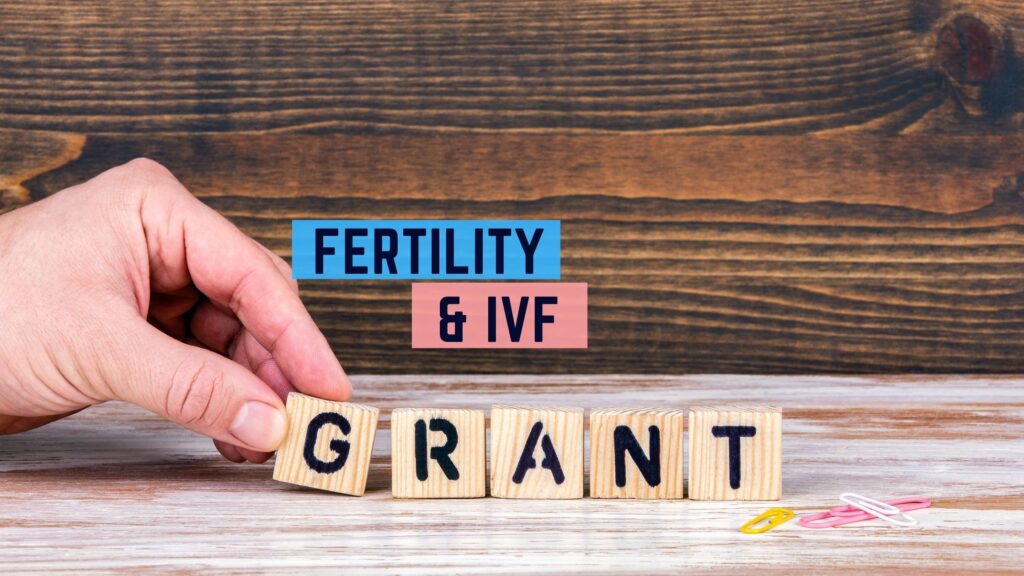
How IVF Grants Work?

Helping Pay for IVF or Fertility Treatments
IVF has enabled over a million people to have babies since it was invented, but the price for this treatment still prevents many from seeking the help it can provide. In this article, we’ll touch on what IVF actually is before exploring one of the best options for affording it: IVF grants.
In Vitro Fertilization or IVF is a revolutionary treatment that can help people who are struggling with many different fertility issues. The procedure involves a doctor taking an egg from a woman and sperm from a man, then uniting them in a lab, and implantation the fertilized egg back into a woman’s womb to grow as it normally would. This process allows the maximum amount of control over one of the most delicate stages in the process of having a baby which enables doctors to bypass a lot of fertility problems that would otherwise prevent or hinder pregnancy.
IVF can help couples (and individuals) that struggle with endometriosis, fallopian tube issues, sperm production problems, genetic disorders, and many, many other fertility roadblocks. It is also crucial for lots of same sex couples who wish to use a sperm donor or surrogate mother. IVF is so effective at dealing with so many fertility issues that it is often used as a first treatment when doctors can’t diagnose what is preventing pregnancy.
More and more people are using this technology, too. According to Co-fertility, 1.9% of all babies that are born in the U.S. in 2018 were IVF assisted babies. In short, in vitro fertilization is an incredibly versatile and effective treatment that can and does help many people achieve their dreams of becoming parents.
For many people, however, IVF is too expensive to even consider. At $10,000 to $11,000 a cycle with multiple cycles often needed, IVF is simply out of many people’s price range. The price tag for this treatment is a non starter for lots of people that simply do not have the money in their budget to afford it. This is where financial aid like IVF grants come in.
What are IVF grants?
IVF grants are like scholarships for IVF treatment! An organization, usually a nonprofit or a clinic, will offer a set amount of money to help one lucky couple or individual with their IVF process.
Like a scholarship, you have to apply to receive the money that is being offered. The money, a one time payment which can only be applied to IVF costs and related expenses, goes to the person with the best application. Unfortunately, this does mean that not everybody gets a grant and many people do not get one at all, even if they have applied for several.
Unlike a loan or other financing options, once you receive a grant, you don’t have to pay it back! It is a gift to further your IVF journey. Grants can be worth anywhere from $250 to $25,000. Depending on which grant you apply for, getting selected could mean a little help with affording this month’s cycle or it could mean having your entire IVF journey paid off.
Why grants?
IVF is an expensive treatment, but unlike many other medical treatments, it is not always covered by insurance. According to Resolve.org, one of the leading sites in infertility information, only 13 states in the U.S. have laws that require insurance to cover IVF when relevant. This puts many couples in need of treatment in a uniquely vulnerable situation: they have to try to pay for IVF out of pocket.
There are lots of financing and loan packages available to help mitigate the cost of in vitro fertilization and many clinics even have in house financial counseling. Sometimes, however, borrowing or saving enough money for IVF just isn’t an option. IVF grants exist to help people in this situation still achieve their dreams of having a child.
How much will grants help?
The short answer is that it varies. There are lots of different grants available and each helps the people who receive it in a different way. As we mentioned previously, the monetary value of grants can vary quite a bit, but some grants just provide IVF medication or services directly, cutting out the money aspect entirely.
While there are lower and higher end grants, many, if not most grants aim to provide around $10,000 in aid or the equivalent amount of medical service because that is roughly the amount that one IVF cycle costs.
Who gets grants? Why?
Like academic scholarships, IVF grants often come with requirements for application. These can be geographic (you must live in a certain area), financial (you must make less than a certain amount a year), cultural (you must be a member of a particular church or organization), relationship based (only for singles, only for couples, or only for same sex couples), or medical (you must have a particular kind of diagnosis, be a certain age, or be in general good health).
Often the foundation, nonprofit, or clinic will want to help a specific group of people that they think needs help. This narrowing of focus might rule you out of some grants, but it also might make you more competitive for others! If a grant specifies that you must live close to the city you live in, you may be more likely to receive that grant than if it were open to everyone across the country. It is important to look for grants that fit your specifications and demographics because you might be exactly who the providers of the grant want to help.
Generally speaking, the organizations that offer IVF grants want to help the people that need it the most and will be most likely to benefit from it. Because of this people with less income may be prioritized because they need help more and people who are under 35 and are otherwise healthy may be prioritized because they have a greater chance of a successful treatment.
Not all grants come with lots of requirements, however! Some are open to everyone across the U.S. who needs help with IVF. Even if you don’t see an IVF grant with requirements that sound exactly like you, it’s still worth applying to the general ones.
How easy are grants to get? How common are they?
IVF grants can be a bit of a hassle to apply for. Many of them will require an application fee, usually $50. The ones with requirements will want proof that you meet those requirements, which will often include medical documents, proof of registry, and the like. These factors can make it frustrating to finish an application, but ultimately the inconvenience is fairly minor and the potential payoff is well worth it.
As far as availability goes, there are thirteen grants featured on Resolve.org and dozens more that are not listed on their site. This might seem like a lot, but remember that there are likely to be hundreds of applicants for each grant. Unfortunately, that does mean that many IVF grants will be fairly competitive and that most people who apply will not receive anything.
It’s easy to get caught up in the idea of finding free IVF or getting financial aid to help with treatments, but the reality is that receiving an IVF grant isn’t something you can count on. Grants are absolutely worth applying for– they can completely change your whole IVF journey– but you can’t base your plan on the assumption that you will receive one.
Where should people look for grants?
The first step in searching for IVF grants is contacting your fertility specialist. These professionals will have the inside scoop on the grants that you will want to apply for. In addition, many fertility clinics will have an in house financial expert who can help to guide you through the process of finding and applying to grants.
If you are just in the first stages of considering IVF and haven’t found a fertility professional yet, there is plenty of information on the internet! Resolve.org is one of the best places to find information and FertilityIQ also has an excellent list of available IVF grants.
Surprisingly, social media is another good way of hearing about and discovering IVF grants. Many of the organizations that offer grants have social media accounts on instagram and facebook and make announcements about upcoming financial aid opportunities on these platforms. Some of them even offer exclusive grants to their followers!
Conclusion
While they can be competitive and frustrating, IVF grants are still worth applying for. You can’t rely on the idea that you will get chosen for a grant, but submitting an application (or five) is absolutely a good thing to have in your back pocket, just in case it works out. Receiving a grant can completely change your fertility journey for the better, and isn’t that worth betting on?
